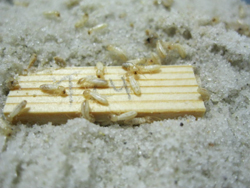Synergising eco-friendly pesticides
The EU-backed 'Development of new ecological pesticides by incorporation of synergic bio molecules' (BIMOSYN) project, composed of academia and five small and medium-sized enterprises (SMEs), was initiated to address these concerns. Scientists investigated the use of promising plant extracts from antioxidant-type and medicinal-type plants in certain insecticides and fungicides. Their aim was to reduce the toxic chemical concentration while increasing their efficacy against pests. Scientists were highly successful in their endeavours and several breakthroughs were achieved. After screening several extracts, two compounds were shortlisted for use in wood protection and urban pesticide products. Tests were carried out to enhance synergy with selected chemicals and optimise the extract-to-biocide ratios. Project partners successfully increased wood resistance against fungal degradation and xylophagous insects such as termites and bark beetles by using these extracts with wood protectors. Several insecticides combined with extracts showed better house fly control than insecticides alone. Project partners developed water-based biocide prototype formulations for urban pests and wood protection that demonstrated good chemical stability and biological efficacy after optimising the extraction process. In accordance with European standards, their effectiveness and ecotoxicity against certain fungi, termites and Hylotrupes larvae were tested with promising results. BIMOSYN members then worked on industrial validation of their prototypes through real case scenarios such as testing timber impregnation with formulations in an autoclave. Fungicides showed wood penetration up to 20 mm and passed criteria for use in fences and doors not permanently exposed to fresh or salt water. Insecticides demonstrated effectiveness against cockroaches but were not commercially viable due to the plant extract extraction and addition process. SMEs are working on commercialising the wood protector and sprayable insecticide products after further optimisation and patenting. Besides a positive impact on wood protection and urban pest sectors, these eco-friendly products will reduce air, ground and underground water pollution.



